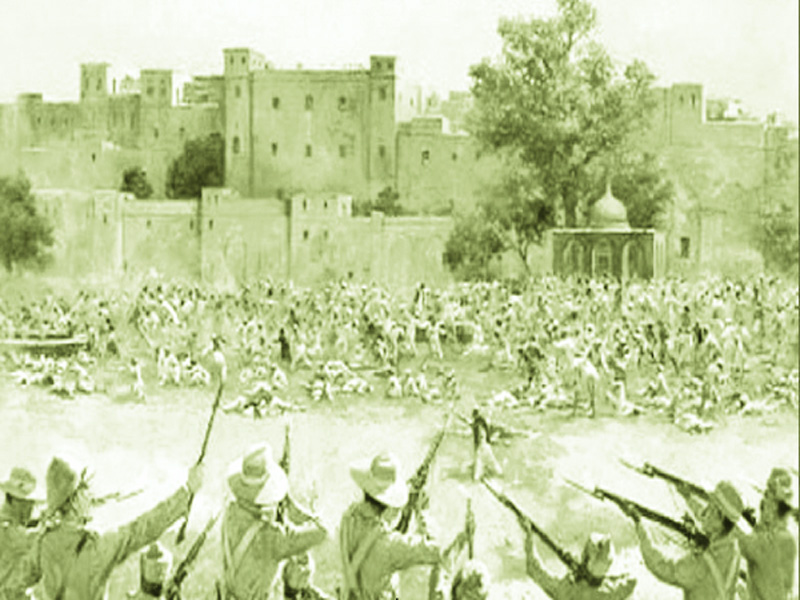If the UK apologises for Jallianwala Bagh massacre, the Muslim countries should also be made to do the same for Timur and Nadir Shah’s crimes
Every year, as April 13 approaches, there are demands in India that Britain should apologise for the Jallianwala Bagh massacre in Amritsar (and, in general, even pay reparations for colonial loot). For it was on that day that Brig-Gen Reginald Dyer carried it out in 1919. The demand, based on a misunderstanding of history, is frivolous at best and fraught with misuse at worst.
A few questions need to be asked: Why do we always demonise and malign the British? Why don’t we seek an apology from Iran for the general massacre that Nadir Shah ordered in Delhi in 1739? Or from Afghanistan whose Ahmad Shah Abdali ordered the mass slaughter and enslavement of women after the Third Battle of Panipat (1761)? Or from Uzbekistan, from where Timur came, invaded India in 1398, and in a single day slaughtered one lakh Hindus?
According to Encyclopedia Britannica, “A devout Muslim, Timur alleged that his co-religionist Sultan Nasiruddin Mahmud of Delhi was being too lenient toward his Hindu subjects... By the time Timur approached Delhi, his army was so encumbered with loot and captured slaves that military efficiency was imperiled. Timur’s solution was to order his followers to kill all their slaves—possibly around 100,000 people.”
Ahmad Shah Durrani or Ahmad Shah Abdali perpetrated Wadda Ghallughara or the ‘Great Massacre or Holocaust or Sikh Genocide’ in 1762. According to an Indian Government website, after the Third Battle of Panipat in 1761, Abdali looted Delhi and captured thousands of women. “When Ahmad Shah Durrani started his journey to go back to Afghanistan, Sikhs attacked his forces, right from River Sutlej to the River Indus and liberated about 2,000 women prisoners.” Abdali retaliated next year, killing thousands of Sikhs.
On March 22, 1739, Nadir Shah of Persia ordered the notorious qatle-aam (general massacre) in Delhi. His soldiers slaughtered 20,000 men, women and children in just six hours.
More importantly, all these mass murderers are heroes in their respective countries—and for many Muslims elsewhere. Pakistan, for instance, has named weapon systems after Abdali, Ghaznavi, and Gauri.
On the other hand, there is no evidence to suggest that Gen Dyer is lionised as a hero in the UK. No Briton in the right frame of mind — certainly not among its ruling and intellectual elites — glorifies him today. And yet we demand an apology from the UK, and not from Muslim countries! This is perhaps because nobody wants to attract the charge of Islamophobia, a weapon of mass deception used against anyone daring to ask politically incorrect questions.
Should India insist on an apology from Uzbekistan, Iran, and Afghanistan? The answer is a big ‘no.’ For that would give legitimacy to an erroneous concept: intergenerational transference of guilt. No man in any civilised country in the world today can be punished for the crimes his grandfather committed. Similarly, no country should be asked to atone for the sins it committed a century ago.
History of mankind anyway is the story of wars and bloodshed, empires and enslavement, tyranny and oppression, cruelty and oppression, massacres and genocides. Poor understanding of history results in reading it as a morality play and desiring to right the past wrongs. For the past can neither be edited nor rectified; Jallianwala Bagh can’t be undone; if we try to do that, the consequences would be deplorable. We should not forget that history is about what was in the past, not what it should have been.
Quite apart from the untenability of the apology business, there is the issue of its dangerous repercussions in India. In a country where identity politics and unctuousness are the defining features of public life, the dangers can scarcely be overemphasised. As it is, a lot of people capitalise on the public sentiments related to communities, languages, regions, etc; states fight each other over rivers, often ignoring Supreme Court rulings. If the apology madness catches up, the consequences will be deplorable.
We should not forget that all nations, communities, etc., have committed crimes in the past. So, we should not be surprised at the birth and growth of some Shiv Sena-type outfit in Odisha, demanding an apology from Bihar, as the great Mauryan King, Ashok, from that state had slaughtered 1 lakh people and displaced one and a half lakh people thousands of years ago.
There may be demands from Hindu bodies for an apology from the Muslims. That several Muslim rulers carried out massacres of Hindus, imposed the discriminatory jizya tax, and generally oppressed them is well-documented, even in the books and accounts of Muslim scholars.
Similarly, the suppression and cruelty that the Shudras suffered at the hands of the so-called high castes is also well-documented. Then there are tribal people, who were exploited by practically everybody else. Therefore, Parliament should pass a resolution seeking the forgiveness of these groups.
This is just a brief list; if the apology mania begins, it will grow by the day; real and imaginary wrongs of various communities and interest groups will proliferate. This will not just further vitiate public discourse but also cast its shadow on the political arena. An orgy of apology demands follow, opening up a Pandora’s Box.
(The writer is Resident Editor, The Pioneer, Delhi. He has authored There Is No Such Thing As Hate Speech, Bloomsbury (2017))


























